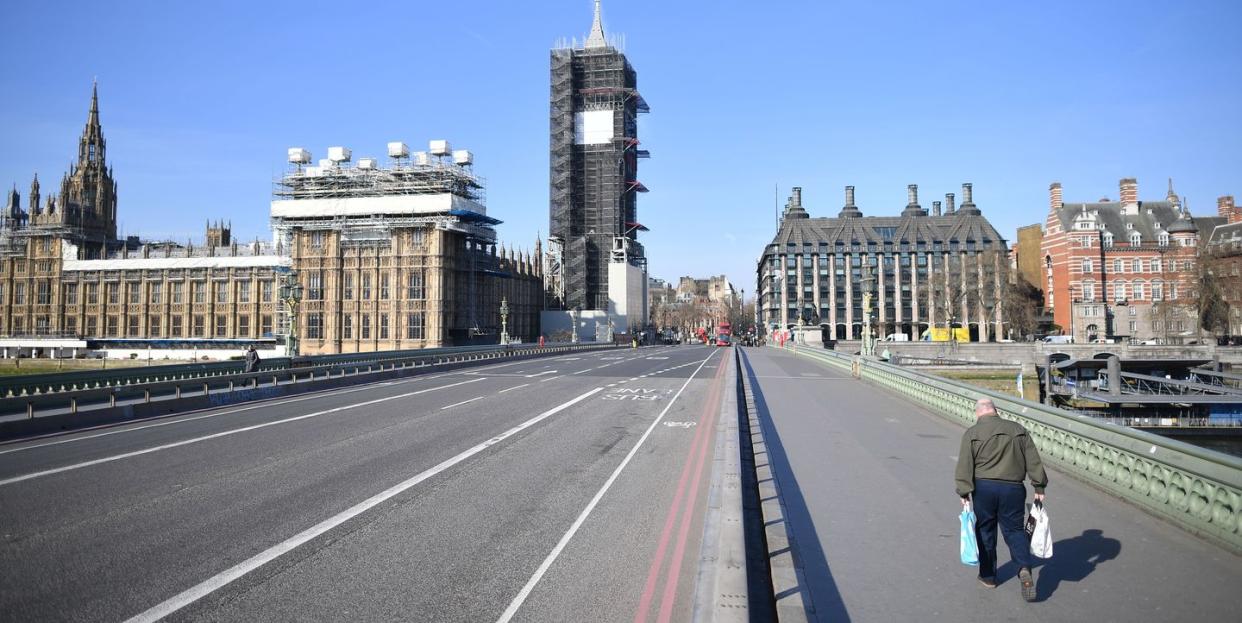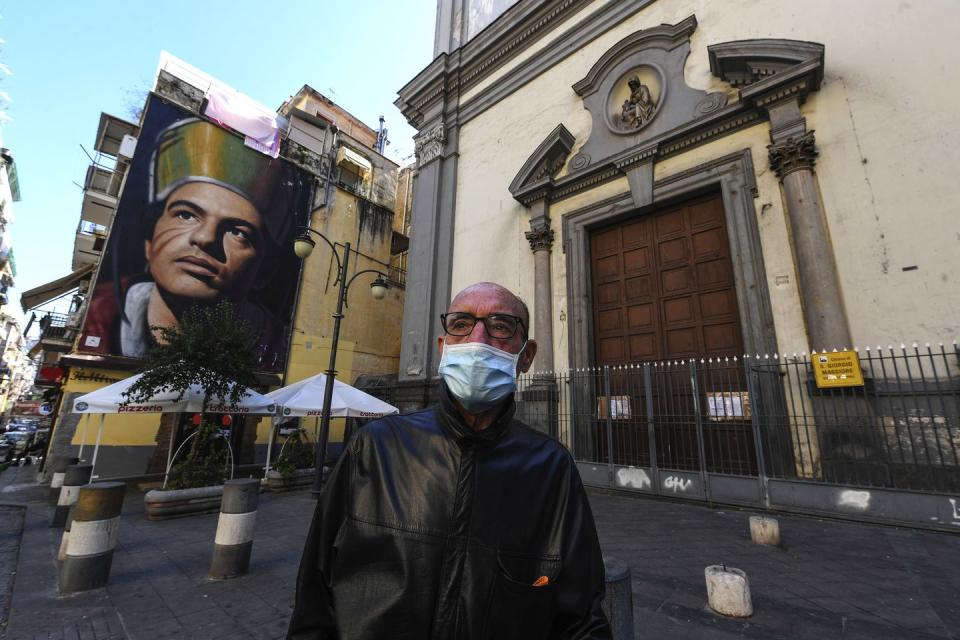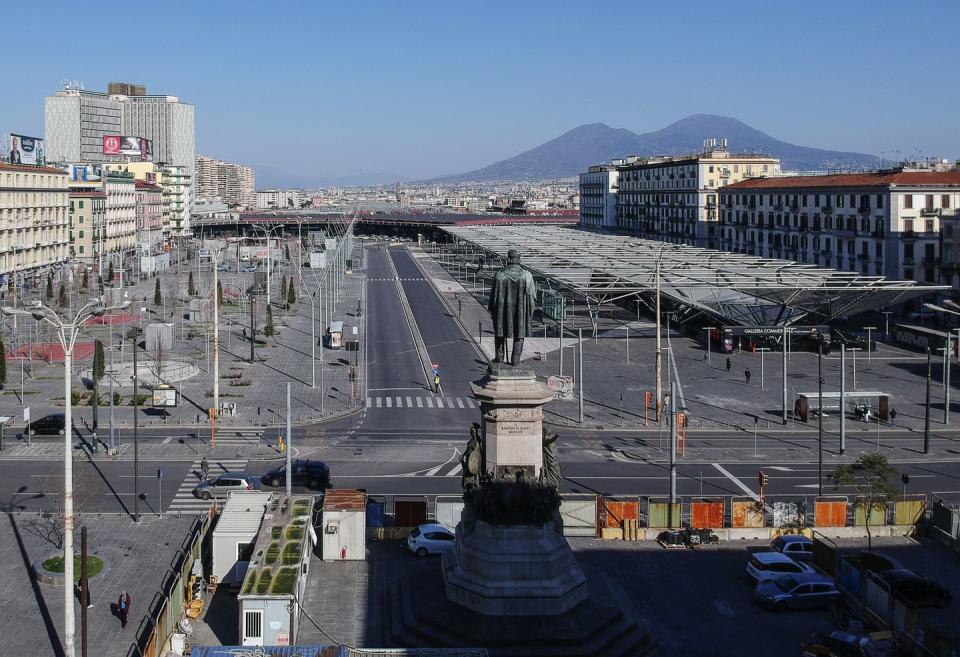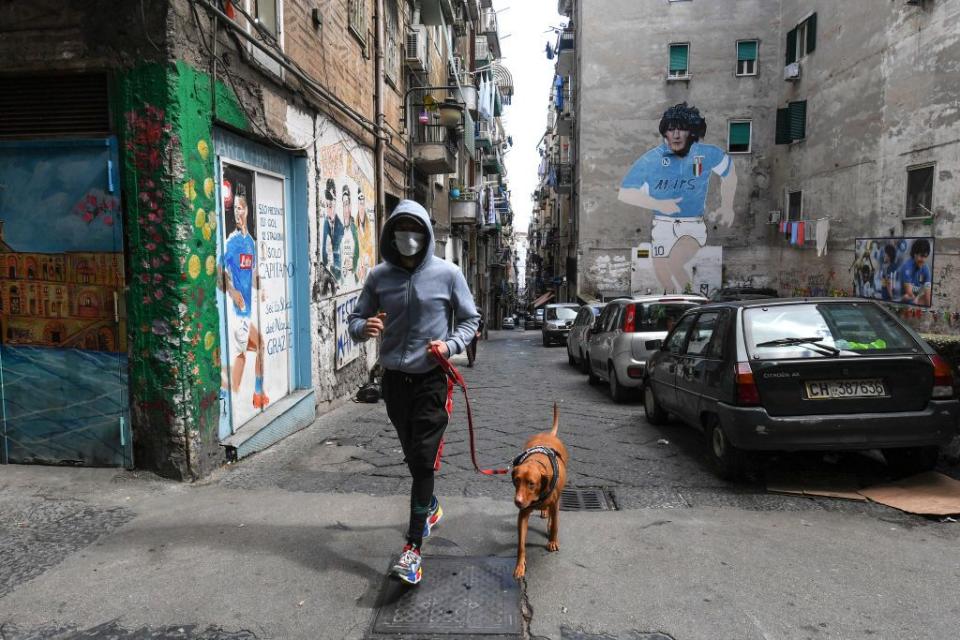Life In Lockdown: Lessons For The UK From Italy

Update (24/3/20): Britain is in lockdown.
When this piece was first published, last week, the UK government was advising a policy of social distancing to tackle the outbreak of the novel Coronavirus and Covid-19. From today, as the death toll hits 335 and the British public proves itself incapable of staying away from parks and off golf courses, Boris Johnson is following the Italian prime minister's lead and legally enforcing a more stringent lockdown. As of now, you have to stay at home and can only leave the house to buy food or medicine (head here for a full guide to what you can and can't do in lockdown).
Writer Alexis Self, currently based in Naples in the south of Italy, has been living in lockdown for more than a fortnight. The death toll in Italy has risen to more than 6,000 and the country is experiencing a higher mortality rate than anywhere in Europe, partly because of its elderly (and therefore more at-risk) population, but also because of the way people responded at the start of the quarantine, fleeing the locked-down north and unwittingly spreading the Coronavirus further afield.
The lessons from Italy offer a guide – and a blueprint – for how the UK's Coronavirus crisis might unfold, as well as the steps we could take to slow its progress, and a lesson in how to survive as a community when movement and social interaction are curtailed. Despite the challenges of Covid-19, Naples is battling on, with citizens supporting each other through the crisis and pulling together to protect the most vulnerable. As things get darker on our shores, let their experience be a light guiding our way.
When people quote William Blake’s aphorism that hindsight is a wonderful thing, they tend to forget how it ends: “But foresight is better, especially when it comes to saving life, or some pain!” Since arriving in Italy more than a month ago, I’ve been keeping a daily diary. Looking back over it, I’m shocked at my own inability to spot the signs of impending doom.
The pace at which the coronavirus pandemic has spread is bewildering. Barely a week ago, afternoons were still about siestas and negronis. Now, it’s illegal to leave the house unless you’re buying medicine or food. Though I originally came here to experience a very different, perhaps imaginary version of this country, I’ve been moved by the locals’ response to this generational crisis, a batten-down-the-hatches mentality tempered with grace, humour and solidarity.
The original plan, I would tell my friends (with what then seemed like wit), was to “see Naples and die”. The truth is that, from a young age, like millions before me, I have been beguiled by Italy. It wasn’t simply its aesthetic beauty, its architecture and landscape, but what Shirley Hazzard described as, “the admixture of immediacy and continuity, of the long perspective and the intensely personal.”
I left Britain in the grips of Storm Dennis and, as my plane lurched above the grey clouds, looked forward to four months of discovery (and warmth) in a place still dedicated to the twin cults of beauty and leisure. I had a job teaching English in the afternoons, leaving my mornings free for reading, writing, or simply taking a front row seat at an immersive performance of the Italian dance. During that first week, wide-eyed and insufferable, I would rhapsodise at Neapolitans about the unique vitality of their hometown. Most would respond that if I were here long enough, I would notice some bad things as well.

By mid-February, coronavirus was already causing problems in the North, but the government in Rome acted uncharacteristically quickly to isolate the centres of the outbreak. As schools and businesses in Lombardy and Veneto, Italy’s two richest regions, began to close, photos filtered through of deserted streets and I joked over the phone to my girlfriend that now would be the perfect time to visit Venice.
Due to linguistic ignorance, and perhaps a wilful desire not to ruin my trip of a lifetime, I tried to avoid the already incessant stream of coronavirus content that was flooding the infosphere. I got my news second-hand, from my students and my boss at the school, a Welsh woman who has lived in Naples for 35 years.
So as Italy descended into panic, I still thought I was Julia Roberts. Skipping between my students’ homes, in the hilly neighbourhoods that surround the old town, I would occasionally catch a glimpse of Naples, rose-hued in the late afternoon light, Vesuvius’s twin peaks in the distance. Stopping to catch my breath, I would congratulate myself that I was living here, sharing this place with the millions who called it home.

But then the crisis became impossible to ignore. The city’s metro, built in the 2000s, is a beautiful, but often useless, mass transit system and its intermittent trains transformed into the incubators of my early paranoia. As Carnevale (Mardi Gras), which is a big deal here, approached, events were cancelled above ground. In the last days of February, after Napoli nearly beat Barcelona at the San Paolo, the city’s mayor announced the closure of its schools.
I began to bolt at the sound of coughing, a tiring endeavour in a city of habitual smokers. I’d then clutch my chest and wonder if it actually felt a little tight. Meeting people for an anxious aperitivo, I’d joke that “the only known cure for coronavirus panic is a negroni.”
Italians, historically suspicious of foreign motives, wondered why the virus was affecting them so badly. They told me that the outbreak was being orchestrated by America in order to punish China and those close to it. (Italy is the only European country, and largest nation, to sign up to the Belt and Road Initiative, and many of its largest ports are operated by Chinese companies). I replied that it was probably more prosaic than that.
Like a fever, the crisis escalated rapidly. The Saturday before last, I met some friends for a drink in town. It was raining and we tried to get a seat inside, but a waitress turned us away, though there were very clearly tables free. Apologising, she said that new regulations meant each group had to have an empty table between them. Unbeknownst to us, the prime minister had just ordered the North to be quarantined.
At a different bar, a guy showed me a meme. On the left was a cartoon of someone in a hazmat suit and above it, in Italian, the words: ‘Coronavirus in China’. On the right were three illustrations (a man skiing, a man drinking and smoking, and a man dancing), and above them: ‘Coronavirus in Italy’. He laughed and so did I. I woke up the next morning and checked my phone. There was a flurry of messages from a Neapolitan friend, asking me, in no uncertain terms, whether I understood what was going on. I went back to sleep.
The quarantine was so hastily proclaimed because the right-wing League party, attempting to bring down the government, had leaked it to the press. This led to an exodus from the North, probably spreading the virus farther. On Monday the prime minister, Giuseppe Conte, extended the lockdown to the whole country. People were to remain in their cities or towns and stay inside as much as possible. There was rioting in several prisons and, in Naples, inmates’ wives and girlfriends blockaded the streets.
Since then, the lockdown has evolved into the most severe outside China. Everything is closed except for food shops and pharmacies. Except to visit one of the two, people are not allowed outside, under threat of arrest. I booked a ticket on one of the last flights out, but ultimately, I decided to stay. Nobody moves to this country to spend months indoors (it’s called Eat, Pray, Love not Eat, Pray, Wank) but I wanted to keep my job and, at that point, I still believed that this wouldn’t last more than a few weeks.
Quarantines in Italy are nothing new, indeed the word comes from quaranta giorni (‘40 days’), referring to the amount of time plague victims were isolated for in 17th century Venice. All over Naples, ornate ‘plague columns’ celebrate deliverance from past pestilence, as do beautiful frescoes painted by Mattia Preti above the city gates. Yet, despite this, and my love of Naples ’44 –Norman Lewis’s account of Neapolitan fortitude during World War II – I am still amazed by the city’s stoicism.
My apartment is in Centro Storico, its ancient centre and the largest and most densely populated of its kind in Europe. Though the fulcrum of the city’s burgeoning tourism industry, this is still very much a working neighbourhood. On the street below are two butchers, a fishmonger, two greengrocers, a cheesemonger and a supermarket. Only the latter has queues outside. Shops are well stocked with toilet paper, though flour is harder to come by: people want to be able to make their own pasta if things get really bad.
All over Italy, balcony performances have gone viral. Our local cantante is more Totò than Toto. His repertoire matches his stage: these aren’t the wide boulevards you see on Twitter but narrow vicos, not more than 10 metres in width. You could pass food across them, or a cold. Like a cuckoo clock, without fail, he comes out at six every evening. During gaps in songs he plugs his new CD. I’ve begun to find his shtick a little trite, but my less curmudgeonly neighbours are out every evening, banging pots and pans.
Yesterday at lunchtime, over megaphone, a local padre invited people to say a group rosary. Panariello, the small buckets that act as dumbwaiters for those in high apartments and which are are so integral to Neapolitan life, lift medication and other essentials to vulnerable people who can’t leave the house. Applause erupts whenever doctors make their calls. Not everyone is so sanguine; Antonio tells me a friend of his has split up with his girlfriend and is now sleeping on the couch. People say that there’ll be an increase in divorces when all this over, as well as a rise in births.

Lessons now take place online and my students are a daily inspiration. One told me his grandmother was 17 during World War II and would go days without food, so playing video games isn’t much of a sacrifice. I try to take their minds off things by asking what they will do for their summer holidays, or what they’re eating for dinner, but many want to talk to me about what’s going on in the UK. There was shock here when Boris Johnson’s ‘herd immunity’ strategy was announced; the satirical magazine Lercio (‘Rancid’) proclaimed “Johnson invites the English to spit in each other’s faces to accelerate herd immunity.”
Unlike our own flabby blonde shower, Conte has risen to the occasion. Yesterday (18 March) saw the highest single-day death rate, showing the North is approaching the spike of the outbreak. Experts say it will arrive here in the South in a few weeks. A new hospital is under construction in Naples to help weather it. If you think you have the virus, you can call 118 and someone will come and test you for free. The sirens of emergency vehicles, so sing-song when I arrived, have assumed a sinister lilt. Britain has a headstart on preventing the carnage seen here, though foresight during this pandemic has proved an uncommon thing.
I am encouraged by the reaction of my friends and family who have begun isolation before it has been ordered. I am also grateful for the company of Antonio, a sardonic Puglian with an expert’s knowledge of local history, who says things like, “People have bought dogs on Amazon so they can go outside.” We have become quarantine buddies and made a list of things we will do when it is over, mostly visit certain restaurants.
A few days ago, we ate traditional Neapolitan Sunday lunch (spaghetti with mussels) on the roof. Sounds of domestic life drifted up from the buildings around us, for once undimmed by the roar of scooters below. The sky was amazingly clear and, as it became dark, stars appeared. Looking towards Vesuvius, I thought of how many crises that volcano has witnessed. Hopefully the current one won’t stretch to more than a footnote in this city’s long history.
The information in this story is accurate as of the publication date. While we are attempting to keep our content as up-to-date as possible, the situation surrounding the coronavirus pandemic continues to develop rapidly, so it's possible that some information and recommendations may have changed since publishing. For any concerns and latest advice, visit the World Health Organisation. If you're in the UK, the National Health Service can also provide useful information and support, while US users can contact the Center for Disease Control and Prevention.
For more advice, visit the following recommended websites:
Like this article? Sign up to our newsletter to get more delivered straight to your inbox
You Might Also Like

